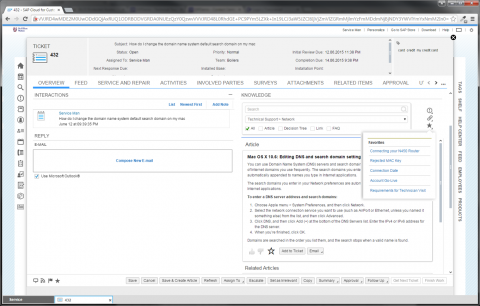|
When people talk about knowledge management integration for SAP Cloud for Customer, MindTouch is often one of the first products mentioned. In this blog I want to introduce you to an alternative and, in my opinion, better product that elevates itself above other knowledge management products through its ability to understand what people mean and not what they say, anticipate what knowledge they will need next and improve through continued use. This is much more than a search engine that can trawl through a repository of documents. The product is Transversal’s next-generation cognitive knowledge platform Prescience and at De Villiers Walton we’ve been so impressed by it that we’ve integrated it with SAP C4C.
Transversal
We’ll get onto the C4C integration shortly but before I do, let’s quickly cover off some of the key features of Transversal Prescience. Understand First and foremost, Prescience leverages patented machine intelligence based on multi-layered Bayesian algorithms to interpret the intent of questions, answer them automatically, and learn from interactions. This means that a Prescience user, whether they be a contact centre agent, web self-service user or employee, can ask natural language questions and have the most likely “right” answers returned to them automatically. Anticipate Furthermore, the user’s next likely questions can be anticipated and presented to them. Prescience automatically predicts what users are likely to ask next, mimicking their “train of thought”. This capability requires zero administration since it is generated automatically and dynamically by the system. Ultimately this minimises a user’s research effort. It is also able to provide users with a prioritised list of suggested questions as they type even where the exact words do not match the content of the knowledge base, further reducing the effort required to get to the answer they need. Prescience is able to apply its conceptual understanding to analyse incoming, real-time data streams, such as email correspondence and social media feeds to anticipate emerging trends, enabling administrators to pre-empt issues requiring attention. Improve Finally, Prescience performance improves over time. Content is optimised by self-learning algorithms as the content is maintained. Throughout an interaction, user ratings and feedback can be captured and used to enhance the next interaction. Prescience provides insight into the effectiveness of the content, for example, search accuracy and knowledge gaps enabling administrators to ensure it always fit-for-purpose. Transversal integration for SAP C4C So, how does Prescience integrate into an SAP C4C environment? As a use case let’s consider the integration of the following Transversal Prescience functionality into the SAP C4C Ticket using the Prescience API:
To support this even further, we’ve also enabled the following functionality
Here are a some screenshots that show the look and feel and capability of our Transversal integration for SAP C4C. Transversal versus MindTouch In my opinion, Transversal’s key strengths lies in its focus on delivering contextual knowledge when and where it is needed, without many of the administrative overheads associated with alternative approaches. Transversal’s common knowledge repository can provide different answers for contact centre and web self-service users according to your needs. Additionally, the product has powerful knowledge administration functionality (Knowledge Feedback, Knowledge Admin and Knowledge Insight). Transversal already has strong capability and an established user base in contact centre, web self-service and HR with many customers using it for more than one of those scenarios. MindTouch by contrast is focused on content management and product documentation and this is perhaps reflected by the fact that 70% of their customers are in the technology sector. MindTouch is predominantly used in web self-service although the integration into SAP C4C suggests ambitions across multiple interaction channels. Ultimately, I believe that Transversal’s cognitive knowledge capabilities of understanding, anticipation and improvement put it some way ahead of the competition. If you are a side by side comparison type of person, then check out Forrester’s excellent, “Vendor Landscape: Knowledge Management For Customer Engagement”.
JAGADHEESWARA RAJU B
7/11/2019 06:26:31 am
We are preparing POC to integrate knowledge management in C4C. Can you please the step by step integration procedure for Transversal into C4C. Comments are closed.
|
Categories
All
Archives
February 2020
|
|
|
© COPYRIGHT 2003 - 2022 DE VILLIERS WALTON LIMITED. ALL RIGHTS RESERVED.
SAP® Business Suite, SAP® BusinessObjects™, SAP® BW are the trademarks or registered trademarks of SAP SE in Germany and in several other countries.
|
PRIVACY POLICY |

 RSS Feed
RSS Feed
